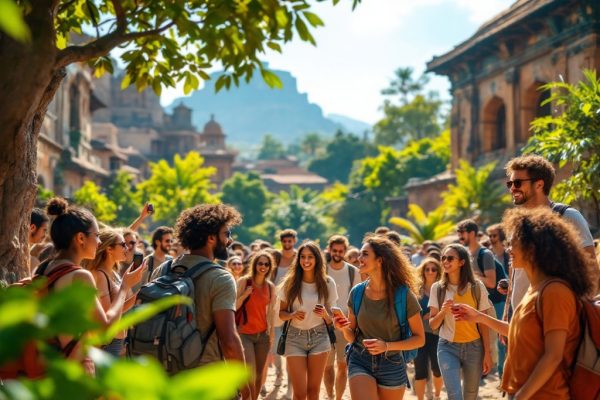Combining Travel and Education: Short-Term Courses in Asian Countries
Want an unforgettable adventure that boosts your resume? Explore Asia with short-term educational courses, combining travel and learning. Develop new skills, improve language abilities, and dive into exciting research while experiencing captivating cultures. From language immersion to volunteering, discover programs in Japan, South Korea, and more. Start your enriching journey today!
Important information

- Short-term courses in Asian countries combine travel with hands-on learning, cultural immersion, and skill development opportunities.
- These programs offer diverse learning experiences, including language acquisition, cultural exchanges, research projects, and historical exploration.
- Participants can improve language skills, gain valuable intercultural communication experience, and enhance career prospects.
- Opportunities exist for both structured learning (e.g., language courses, study tours) and less formal experiences (e.g., volunteering, cultural exchange).
- Planning an educational trip involves defining learning goals, researching programs, and considering factors like duration, location, and cost.
Combining Travel and Education: An Introduction to Short-Term Courses in Asian Countries
Embark on an unforgettable Asian adventure by combining travel and education with enriching short-term courses. These immersive programs offer hands-on learning experiences coupled with exciting cultural exploration. Students can develop valuable new skills, enhance their language abilities, and delve into academic research while uncovering the region’s captivating history. Explore diverse interests with a wide range of options, from language acquisition to cultural exchange programs. Discover something new in countries like Japan, South Korea, Thailand, and Vietnam.
Benefits of Short-Term Courses in Asian Countries
Short-term courses in Asia offer a powerful learning experience, immersing students in new cultures while providing hands-on opportunities. These programs boost language skills and teach valuable abilities, from conducting academic research to exploring local history. Participants gain practical experience and improved intercultural communication, skills highly valued by employers. Consequently, these courses strengthen resumes and enhance career prospects. They also often provide academic credits, networking opportunities, and foster personal growth. Here are some key benefits:
- Immersive cultural experience.
- Hands-on learning opportunities.
- Improved language skills.
- Development of valuable skills (research, historical exploration).
- Enhanced intercultural communication.
- Strengthened resumes and career prospects.
- Potential academic credits.
- Networking opportunities.
- Personal growth.
Experiential Learning and Cultural Immersion
Short-term courses in Asia offer an immersive cultural experience. Students gain hands-on experience by engaging with local communities and participating in cultural activities, which fosters a deeper understanding and appreciation of Asian cultures. Exploring local markets, enjoying regional cuisine, and interacting with local residents all contribute to enhanced learning, personal growth, and improved intercultural communication.
Language Proficiency and Skill Development
Immerse yourself in a new culture and rapidly improve your language skills with an in-country course. These intensive programs combine the thrill of living abroad with effective language acquisition. Alternatively, internships offer practical work experience while accelerating your language learning through real-world application. Experiential learning and cultural immersion are proven to be highly effective for language acquisition. You’ll learn by actively using the language in everyday situations.
Opportunities for Academic Research and Historical Education
Short-term courses in Asia offer unparalleled access to history, allowing students to explore ancient sites and conduct research firsthand. For instance, they can examine Cambodian temples or study historical documents in Japan, deepening their understanding and building valuable research skills.
Valuable learning experiences aren’t confined to Asia. Institutions like the Royal Greenwich Observatory and CERN offer unique programs, including lectures, demonstrations, and hands-on activities, creating engaging and impactful learning opportunities.
Types of Educational Travel Opportunities
Immersive in-country language courses accelerate learning by immersing students in the local culture, leading to rapid language acquisition. Study tours provide invaluable real-world experience and practical skills through research and fieldwork. Cultural exchange programs and volunteering offer profound benefits for cultural immersion and personal growth, creating truly unique experiences. Examples include teaching English in a rural school or working with a local NGO.
In-Country Language Courses for Rapid Advancement
Immersive in-country language courses accelerate learning by placing students directly within the native context, significantly boosting fluency. These courses combine structured lessons with real-world practice, improving both comprehension and conversational skills. Cultural immersion complements language acquisition, providing practical experience and valuable cultural insights. This integrated approach fosters a deeper understanding of the language and its nuances. The benefits of these programs include:
- faster language acquisition,
- improved conversational fluency,
- enhanced cultural understanding.
Study Tours: Real-World Research and Fieldwork
Study tours offer an incredible immersive learning experience, typically lasting four to six weeks. They combine language training with valuable fieldwork and institutional visits, creating real-world research opportunities. This hands-on approach allows students to gain valuable experience, deepening their understanding and broadening their perspectives. Students develop a greater appreciation for diverse cultures and global issues through direct engagement with the local environment and community. The combination of structured learning and practical application makes study tours a powerful tool for personal and academic growth. They foster adaptability, problem-solving skills, and cross-cultural communication, enriching the overall educational journey.
Cultural Exchange Programs and Volunteering Opportunities
Cultural exchange programs offer immersive cultural experiences and educational advantages, bridging cultures and fostering understanding.
- Experience a new culture firsthand.
- Gain educational advantages.
- Bridge cultures and foster understanding.
Volunteering provides another avenue for personal growth, allowing you to gain hands-on experience, develop new skills, and contribute to a community or cause. For instance, you could teach English, engage in conservation work, or participate in community development projects.
- Gain hands-on experience.
- Develop new skills.
- Contribute to a community or cause.
- Examples include teaching English, engaging in conservation work, or participating in community development projects.
Both cultural exchanges and volunteering promote personal growth and broaden your global perspective.
Designing Your Educational Travel Experience
Planning an educational trip? Defining clear learning goals is key. These objectives will guide your program selection, ensuring alignment with your interests. When researching programs, consider factors like duration, location, and the balance between structured learning and free time.
Enhance Your Educational Journey
A successful itinerary blends educational activities with cultural immersion, maximizing both knowledge acquisition and personal growth. Reflect on your learning style and preferred level of independent exploration to craft a truly enriching experience that combines structured learning with the thrill of discovery.
Program Examples
- One program might offer morning classes followed by afternoon excursions.
- Another could feature week-long intensive workshops.
Setting Learning Goals and Choosing the Right Program
Choosing the right program depends on having clear learning objectives. First, reflect on your interests and academic goals. What skills do you hope to gain? These questions will guide your program research. Explore various programs, reading reviews and scrutinizing curricula. Consider practical aspects, such as location, duration, cost, and accommodations. Connecting with program coordinators and alumni can offer valuable insights.
Define your learning objectives. Reflect on your interests and academic goals, identifying the skills you want to acquire.
Research various programs. Explore different options, reading reviews and carefully examining the curricula.
Consider practicalities. Evaluate factors like location, program duration, cost, and accommodation options.
Connect with program representatives. Reach out to program coordinators and alumni to gain valuable perspectives and insights.
Blending Adventure with Educational Opportunities
Personalize your educational journey by combining adventure and learning. Imagine exploring ancient ruins while delving into history, or immersing yourself in a new language while living with a host family. For scientifically inclined minds, consider visiting historical landmarks like the Royal Greenwich Observatory or CERN. These sites offer tours, exhibits, and workshops to engage your curiosity.
Special Programs and Their Unique Offerings
Service learning powerfully combines community service with academic learning, offering hands-on experience and valuable cultural immersion. Participants develop new skills while making a tangible difference in the community by engaging in activities such as teaching English, contributing to environmental projects, or assisting with local healthcare.
Service Learning and Community Projects
Service learning integrates academic study with practical community engagement, allowing students to develop real-world skills while enhancing their understanding of social issues. Community projects promote valuable cultural exchange and nurture personal growth through active involvement in local initiatives. These experiences cultivate a comprehensive education and broaden career opportunities.
How to Maximize Travel Opportunities for Education
Study abroad programs offer immersive cultural experiences, broadening students’ perspectives and fostering global awareness.
International internships and research projects cultivate valuable skills, providing practical experience and boosting professional development.
Independent travel during breaks complements studies, allowing students to explore new cultures and broaden their perspectives.
Hands-on learning opportunities, such as archaeological digs or ecological surveys, provide practical experience, enhancing real-world skills and knowledge.
Attending international conferences and workshops boosts professional development, expanding networks and fostering career prospects.
Universities often support these endeavors through travel grants and scholarships, making educational travel more accessible.
While funding can be a challenge, the benefits of educational travel are substantial.
Integrating travel into education powerfully prepares students for a globalized world.
Integrating Travel into Degree Programs
Enhance your degree and earn credits towards your major or minor with a study abroad program. History and Political Science students, in particular, can gain invaluable firsthand experience, boosting their learning in a powerful way.













